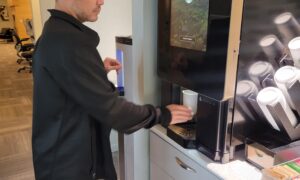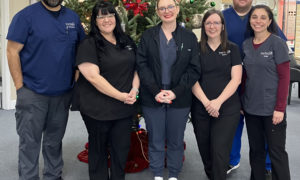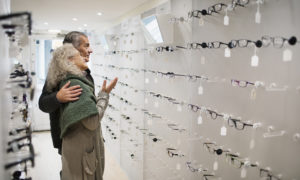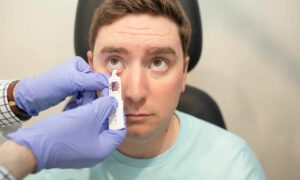Beverly Jue-Smith, OD, MBA

January 7, 2015
SYNOPSIS
Employees with the ability to work effectively with colleagues and patients deliver a superior patient experience.
ACTION POINTS
LOOK FOR ABILITY TO READ OTHERS. Employees should be able to take verbal- and non-verbal cues from others and then meet their needs.
RECOGNIZE POSITIVE ATTITUDE. Note if applicant answers questions without being defensive and with a smile, and emphasizes ability to work with others.
NURTURE PEOPLE SKILLS. Have new employees role-play challenging patient situations and then talk about the best way to respond.
In any service or hospitality profession, especially in healthcare, it’s all about how to connect and establish a relationship with people. That’s why I hire for what I call “people skills,” being able to effectively understand other people’s emotions and intentions, and respond in an empathetic way, so that their needs are met.
We are a five-OD practice in San Ramon, Calif., with a support staff of 18, around 7,500 comprehensive exams performed annually and annual revenues of over $2 million.
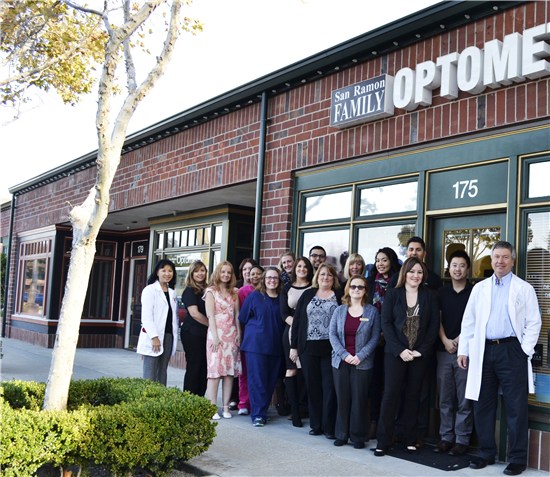
The staff of Dr. Jue-Smith’s practice, posing outside the office. Dr. Jue-Smith advises hiring people who have an intuitive understanding of others and enjoy working collaboratively.
What Are People Skills?
In the interview process, I try to read a person for their people skills. I try to hone in on the applicant’s personality and their mood within a short amount of time by gleaning information from how they shake your hand, their body language, their facial expressions, their voice, and their behavior, all the while listening attentively to them.
These skills come easily for those with a natural tendency to care about others and those with an earnest desire to care for and connect with people. I believe it comes naturally for some, and for others it can be developed. It requires the ability to find a commonality with another in order to communicate with them in a way that will prove to them that you really care and are acting in their best interest. It’s not unlike the skill of making a new friend. Being sensitive and respectful are critical factors in building and maintaining a relationship of trust and confidence with patients.
Entire Staff Should Demonstrate People Skills
I am fortunate that all of our current staff have people skills to varying degrees. Having people skills with a caring and friendly personality are what we primarily look for in our team of doctors and staff.
Every front desk employee always looks up immediately with a smile and greets our patients before they get to the front desk. Sometimes all of them do it at the same time. It’s a great feeling, even for the rest of our staff, to be greeted like this when they enter the office!
Every time any patient moves through the clinic, they are greeted with an introduction, handshake and smile. After the handshake comes a question or a comment to start building a relationship and conversation with the patient to put them at ease and make the interaction more personal. Our opticians are great at finding commonalities like hobbies, books, children, sports, and the like. Hearing them laughing with patients is the hallmark of having a staff with strong people skills.
How DoPeople Think of Your Practice?
What people remember most about a practice, and what they are most impressed by, is how they are treated. I often like to remind staff about how Disneyland makes people feel. What makes it bearable to wait in lines for hours? The smiling and accommodating employees and the festive, happy atmosphere.
We have all the latest instrumentation and a clean, modern, updated office, but the impression that lingers with people is how friendly and caring the staff is.
There are a lot of optometry practices, and you have to decide how you will differentiate yourself for the long term.
Establish Interview Process
The owner-doctors of the practice interview applicants after the manager of the specific department in our practice has pre-screened the applicant over the phone.We have a manager for each of our three departments: Administration manager, Optical manager and a Clinic manager. We will soon add a back lab manager in charge of all the in-house edging. After one of these managers has that initial phone interview with the applicant, the doctor-owners sit in on an in-person interview, along with the manager, and asks the applicant questions.
If the applicant seems promising, we would ask the applicant to come in for a working interview where they would role-play and we would pretend to be a patient. This process may sometimes be done on the same day as the interview and sometimes on a different day.
Our turnover with a staff of 20 averages one to three people/year, however, some years we have no turnover. NOTE: The MBA measure staff turnover at an average of 20 percent per year, with two-thirds of all practices experiencing some staff leaving each year.
Recognize Signs of People Skills in Hiring Interviews
I think non-verbal skills are sometimes more important than verbal skills. I consider the applicant’s ability to maintain good eye contact, how they shake my hand, and if they are listening with attentive body language and mannerisms. I want to know if this person is sincerely interested in what I have to say. I also try to ask open-ended questions to find out how comfortable they are conversing with people they don’t know. Do they smile? Are they easy to understand? Are they conversational and match the tone-level of the conversation? Are they respectful and demonstrate good communication skills?
Revealing Questions to Ask During Hiring Interviews
You want employees who can converse easily with your patients. There are questions you can ask that will tell you a lot about the prospective employee, based on their ability to answer in a friendly, pleasant, intelligent way.
Some questions I ask:
• How was your drive to the office?
• Please tell me about your last job? What did you like best/least about it?
• Why do you want to apply for this position?
• Do you have any hobbies or outside interests?
• What are you looking for in a position at our office?
• How do you handle an irate patient?
• What frustrates you? How do you handle it?
• If you were at a party with people you don’t know, do you hang back and observe, join a group or find someone to talk to?
Note Responses to Questions
Here are good responses to some of these questions:
Please tell me about your last job? What did you like best/least about it?
“I was the front office receptionist. I checked in and checked out the patients, I handled the billing, and the phones. I really enjoyed seeing returning patients come in; it was like seeing an old friend. Sometimes it would be difficult to juggle the phone and people at the desk, but I found if I gave everyone my full attention, thanked them for their patience, and engaged them in pleasant conversation, they would relax, and so would I.”
Why do you want to be in this profession?
“I enjoy keeping busy and meeting people. It’s fun to find out what other people are up to. I actually learn a lot from other people, like what new movies, restaurants and books are out.”
What are you looking for in a position at our office?
“I am looking for an office where everyone works as a team and where I can learn new things. I like to keep busy and having a variety of things to do. I would like to work in a busier office where there are always people around.”
How do you handle an irate patient?
“I would listen to them without interrupting them. Then I would apologize for the incident, thank them for taking the time to let us know about it, and come up with a solution immediately and ask them if that would solve the problem for them, or ask a manager to come help them.”
Get Feedback from Staff on New Hire
On occasion I have introduced an applicant to the staff just to find out how the applicant reacts to meeting new people and to see how they interact with them. It is most beneficial to introduce the applicant to the staff members who have the strongest people skills since those staff members can bestjudge those skills.
Nurture People Skills Once Hired
Constant and frequent role-playing of challenging patient-staff situations, such as insurance misunderstandings, is key. Having employees see themselves role-playing on video can add additional power to this exercise. Sometimes I have employees attend seminars on business skills or read articles on handling difficult situations in the workplace.
Establish and Reinforce Practice Culture
The value you place on people skills has to become ingrained in your staff’s day-to-day activities. As a practice owner, I have to set the bar and be the primary example of quality interactions with patients. Staff always watches the owner/doctor, and how they interact with their patients, as a model for their own behavior.
In addition to modeling good people skills, we work on making sure our staff interacts with each other respectfully and works as a team. I walk around the office frequently observing patient-staff interactions and making sure all patients are being attended to. Our managers are responsible for doing the same.
We also have staff meetings and department huddles about customer service, speakers on customer service, and I often pass out handouts and articles on service skills.
Last, but no less important, we always shake hands with patients and try to keep a smile on our face at all times. A lot of “please”s and “thank you’s” go a long way, too.
Highlight Achievers in Patient Service in Staff Meetings
During staff meetings, we read aloud the good survey reports that patients have submitted about their experience in our office. I also encourage the managers to let me know when someone has gone above and beyond in their patient care. Whenever a patient gives me a personal compliment about a staff member, that staff member gets a Starbucks gift card!
Beverly Jue-Smith, OD, MBA, is the owner of San Ramon Family Optometry, Inc., in San Ramon, Calif. Dr. Jue-Smith also is owner of Optometric Consultants, a private practice consulting firm.To contact her: srfoptometry_drb@yahoo.com



